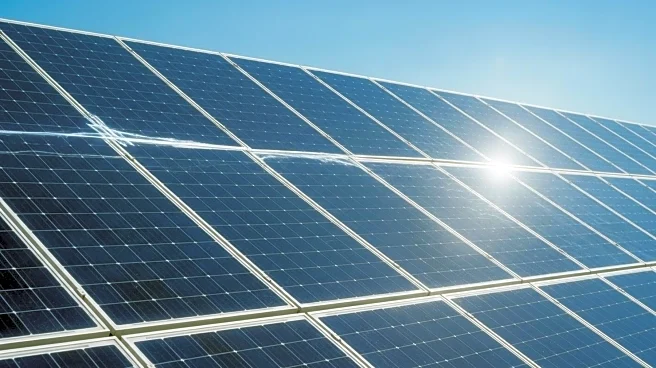What is the story about?
What's Happening?
European Union Industry Ministers convened to deliberate on the future of solar manufacturing in Europe, aligning with the European Solar PV Industry Alliance's annual forum. The focus was on implementing the Net Zero Industry Act and other initiatives to bolster Europe's leadership in clean energy. The meeting included EU ministers, European Commission representatives, and the European Investment Bank, addressing challenges in the solar sector and exploring ways to enhance supply chain resilience and competitiveness. Dries Acke, Deputy CEO of SolarPower Europe, emphasized the need for concrete actions following the discussions. A joint letter from SolarPower Europe and the European Solar Manufacturing Council proposed a roadmap to revitalize solar manufacturing, including revising EU public procurement legislation and expanding State Aid rules. Achieving the EU target of 30 gigawatts of annual solar manufacturing capacity requires significant investments, and these measures aim to boost domestic manufacturing without protectionist trade policies.
Why It's Important?
The discussions underscore the importance of revitalizing domestic solar manufacturing to meet clean energy targets and ensure energy independence. By enhancing solar manufacturing, Europe can create sustainable economic opportunities and strengthen its position as a global leader in clean energy. The proposed measures, including policy revisions and financial support, aim to build a resilient and competitive clean energy ecosystem. This initiative is crucial for reducing reliance on external sources and fostering innovation within the European solar sector. The collaboration between policy, finance, and industry is essential for achieving these goals and maintaining Europe's competitive edge in the global clean energy market.
What's Next?
The next steps involve implementing the proposed roadmap and ensuring that the recommendations are translated into actionable policies. The European Commission and the European Investment Bank are expected to play significant roles in supporting these initiatives. The focus will be on revising procurement legislation, expanding State Aid rules, and increasing investments in solar manufacturing. Stakeholders, including industry leaders and policymakers, will need to collaborate to ensure the successful execution of these plans. The outcome of these efforts will be closely monitored to assess their impact on Europe's clean energy leadership and economic growth.
Beyond the Headlines
The initiative to boost solar manufacturing in Europe has broader implications for global clean energy dynamics. By strengthening its solar sector, Europe can set a precedent for other regions aiming to enhance their clean energy capabilities. The focus on sustainable growth and supply chain resilience highlights the importance of balancing economic development with environmental responsibility. This approach could influence global policies and encourage other regions to adopt similar strategies, contributing to a more sustainable and energy-independent world.















